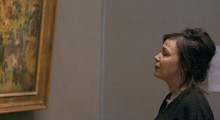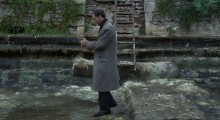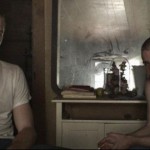Andrei Tarkovsky
-
Testing the Bechdel Test

One of the clever recent innovations at the subscription streaming service Fandor is the ability to filter films using the Bechdel Test. Created by cartoonist Alison Bechdel, the Bechdel Test applies three criteria to judge the quality of female representation in a motion picture: 1) it has to have at least two [named] women in it; 2) who talk to each other; 3) about something besides a man. In a new video essay, “Beyond Bechdel: Testing Feminism in Film,” Lee interrogates the Bechdel Test using films from the Fandor library, asking whether the test is a meaningful criteria when considering […]
by Scott Macaulay on Jul 9, 2014 -
Tarkovsky’s Nostalghia as a Cinematic Candle

I’ve seen it over a dozen times, and Nostalghia‘s late, nine-minute shot of a homesick Russian poet carrying a candle across a pool in an Italian spa in tribute to his mad, suicided friend, still devastates. I always read the scene in Tarkovsky’s penultimate film as the poet’s final ritual, a symbolic act carrying its own final, life-or-death meaning. But the struggle to keep the flame lit while poised between wind and water is obviously a metaphor for life itself, which is how actor Oleg Yankovsky described it in a quote included in the text for a fascinating video based […]
by Scott Macaulay on Mar 24, 2014 -
This is Where You Work: Braden King’s Office

“With all these devices,” Braden King says as he gestures to his iPhone, “you never have to be where you are at all.” The comment is overwhelmingly appropriate, since King’s first narrative feature, HERE, which opens on April 13th at New York’s IFC Center, is about nothing so much as having an appreciation and understanding of where one is. The moment is all the more interesting since King isn’t talking about his film at all; rather, he’s talking about his office space. A connection, regardless, begs to be made. HERE is a formalist reinvention of the road-trip romance, a film […]
by Zachary Wigon on Apr 11, 2012 -
“ZONA” AUTHOR GEOFF DYER HOSTS WEEKEND OF NYC TARKOVSKY EVENTS
I’m halfway through Zona, Geoff Dyer’s book-length consideration of Andrei Tarkovsky’s Stalker but wanted to post now to alert Dyer/Tarkovsky fans to a weekend of great events. In Zona, Dyer critiques Stalker in what feels like real-time, explicating each scene and then allowing his mind to free associate and wander, filling up the book’s many footnotes with fascinatingly digressive asides. I’ll have some thoughts on the book in the next print edition, but take note now of this weekend of appearances in support of the book. If I wasn’t in Austin I’d be at some of these. Friday, March 9—NYC […]
by Scott Macaulay on Mar 9, 2012 -
ALISTAIR BANKS GRIFFIN, “TWO GATES OF SLEEP”

American independent films of the narrative variety are rarely hard art films. But in the case of Alastair Banks Griffin’s Two Gates of Sleep, which bowed at last year’s Directors’ Fortnight in Cannes before finding its way to AFI Fest last Fall, one should be ready to enter a long-take heavy, unspeakably gorgeous dirge that is sure of its influences and even more sure that it has something deeply resonant to express to you. It’s the type of movie that, as the cliche goes, requires the audience to “do some work,” that isn’t going to bend over backwards to entertain […]
by Brandon Harris on Mar 30, 2011 -
The Perfect Swan
(Editor’s Note: This essay contains spoilers.) In literature or in oratory, where rhetoric arose from, it’s somewhat difficult to separate the argument’s mode of persuasion from its substance. In order to make an entirely skilled rhetorical point, the writer or speaker will have to present a series of assumptions and assertions, facts and hypotheses, in such a way that makes the argument’s substance apparent. That’s why literature lends itself to the intellectual: it’s founded upon a progression of ideas. Cinema is often referred to as a different kind of linguistic medium (the “language of film”), but a linguistic one nevertheless, […]
by Zachary Wigon on Dec 10, 2010 -
Nuri Bilge Ceylan, Three Monkeys
YAVUZ BINGÖL AND HATICE ESLAN IN DIRECTOR NURI BILGE CEYLAN’S THREE MONKEYS. COURTESY ZEITGEIST FILMS. In film writing these days, superlatives like “visionary” and “genius” are thrown around all too often to describe directors, though few truly deserve them; Nuri Bilge Ceylan, however, is one of those few. The Turkish writer-director was born in 1959 in Istanbul, and started taking photographs in his mid-teens. He earned a degree in Engineering at Bo?aziçi University, but after graduating he moved on to study film, a newly discovered passion, at Mirnar Sinan University. After a ten-year period spent living in London (during which […]
by Nick Dawson on Mar 27, 2009 -
SHAKIN’ IT WITH TARKOVSKY
For all you Tarkovsky obsessives out there, check out this link, in which the great Russian filmmaker’s son Andrei posts and annotates some of his father’s Polaroid pictures.
by Scott Macaulay on May 29, 2004
